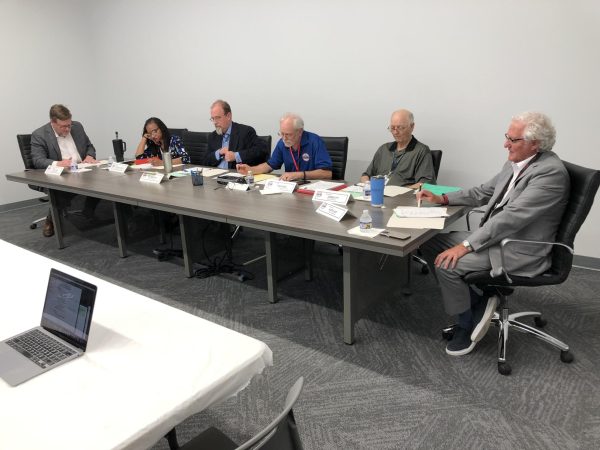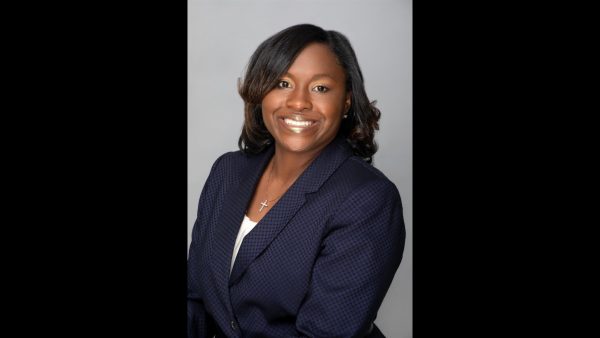After getting kidney, photographer inspires African American organ donation
Photographer Johnny Crawford, who received a stranger’s kidney, hopes his portraits in the African American Transplantation Project will inspire more Blacks to donate organs. His photograph of Hildred Peggy Lyons’ “guns” is his favorite in the exhibit.
Johnny Crawford was a toddler when his mother died of kidney disease.
He had lived a full decade longer than she did when he got a kidney transplant from an anonymous stranger 27 years ago.
Crawford thinks about the lives he’s touched since then as a Boy Scout leader, teacher and photojournalist for the AJC. Would his eldest son have been able to get his PhD in computer science and engineering at Notre Dame if he hadn’t been there?
“I am so happy that some family donated a kidney because who knows if I would’ve still lived to be 58 years old when you consider that my mother died when she was 21,” said Crawford, as he spoke Friday to the Center for Collaborative Journalism at the Tubman African American Museum.
His newest portrait collection, “The African American Transplantation Project” is on display in the upstairs gallery of the museum at the base of Cherry Street.
Due to the COVID-19 pandemic, a virtual webinar opened the exhibit online, but it may also be viewed in person during regular hours through June 19.
In 2019, Asha Ellen, who was an education specialist promoting organ donations with LifeLink of Georgia at the time, visited the museum to see Crawford’s Vietnam Black Soldiers Portrait project.
That collection inspired Ellen to ask Crawford to photograph African American organ donors, recipients and their families to inspire more minorities to commit to being a donor.
It was then that she learned Crawford was living with someone else’s kidney inside of him.
“He definitely understood the vision that I had and the importance of the message of organ donation, particularly when it comes to the Africa American community, because there are a lot of fears, myths and misconceptions about organ donation,” Ellen said.
‘You want to live’
Crawford said some people don’t understand that organs, like blood, transcend races.
“I don’t know if the kidney I got was from a white person or a Black person but if you need a kidney, you don’t care,” he said with a hearty laugh. “I asked my nephrologist if I could get a hog kidney. Life or death, you want to live.”
Ellen recognized the dozens of faces lining the gallery wall and knew all their stories.
“The only thing I can say is ‘Wow!’” she said, as she toured the exhibit for the first time.
She had seen the portraits before, but the impact of the collection was significant.
“It’s a whole lot different when you see them on a computer screen vs. now seeing them actually in the gallery here at the beautiful Tubman museum,” Ellen said. “I feel like a parent that has just given birth. It’s such a wonderful feeling.”
Sylvia McGee, retired educator and president of The Links Incorporated Macon chapter, said her local volunteer organization wanted to partner with the LifeLinks of Georgia Foundation and the Tubman on the exhibit.
“African Americans are about 13 percent of the population but they comprise about 28 percent of individuals in need of an organ transplant,” McGee cited in her research on the topic.
About a third of those awaiting a kidney transplant are African American. In Georgia, about 63 percent of the roughly 5,000 people awaiting lifesaving transplants are Black.
“The same underlying health conditions we’re beginning to see as far as that was exposed due to COVID – you know, high blood pressure, cardiovascular disease, diabetes – those same co-morbidities actually are the main reasons why so many African Americans are so disproportionately impacted by needing life-saving organ transplants particularly when it comes to kidneys,” Ellen said.
‘They’re still living on’
Crawford wants to encourage more organ donations from the Black community.
“There’s a myth Black people don’t donate organs, which is not true,” he said, gesturing to his 33 black and white portraits. “We don’t donate organs in the amount that we need to.”

Valeria Cray’s dark eyes draw you in as you encounter her portrait, Ellen noted.
The Lizella woman received someone else’s cornea in 2007. Think of everything she’s seen since.
Briana Brooks was pregnant when she was kidnapped and murdered execution-style with her fiancé in Atlanta in 2014.
The exhibit shows her two daughters, including the one born prematurely by cesarean section following her mother’s fatal shooting.

The girls are seated with their grandmother who is holding Brooks’ graduation portrait. Behind them is a new member of the family – the man who has Briana’s liver.
“He was not connected. They did not know one another,” Ellen said. “Then sometime after he received his transplant, he was able to connect with Briana’s mother and they are literally like family now.”
Someone else in Ohio has Brooks’ heart pumping life through her veins.
Crawford’s goal is to inspire more organ donations to not only help others at risk of death but provide hope for grieving family members who know part of their loved one lives on. Organ donation can comfort them and hopefully prevent another family from the burden of mourning a life cut short.
Unfortunately, two organ recipients in the exhibit have passed away from COVID-19 and another was killed while riding her bicycle – Hildred Peggy Lyons of Albany.
Of the nearly three-dozen portraits hanging in the gallery, Lyons is Crawford’s favorite. She was the only one privileged to select her pose from the numerous images he snapped.
All her pictures were great, but she chose the one that showcases her healthy physique, which caught Crawford by surprise as he was wrapping up the photo session.
“I thought I was finished and I said, ‘is there anything else you want to do?’ She said, ‘Yeah, I want to show my guns.’”
Crawford was taken aback, not knowing whether she was about to pull out pistols, rifles or shotguns.
“The first thing I thought about was her actual guns, you know the way times are these days,” he said with a chuckle.
“She took her shirt off and flexed and she’s 70 years old. And I started shooting a lot of portraits and that’s why she’s my favorite,” Crawford said. “She showed me something I was surprised to see. Especially a person who is 70 years old and in better shape than I was.”
Lyons had 19 years before she suffered her fatal injuries.
Crawford hopes Lyons and the others who shared their stories will encourage more people to agree to organ donation and make their wishes known to close relatives.
“If you’ve lost a love one, especially some of these people here were killed tragically and the family donated the organs and they’re still living on.”
Contact Civic Jouralism Senior Fellow Liz Fabian at [email protected] or phone 478-301-2976.















Audrey (Bella) Langston • Apr 18, 2021 at 12:17 pm
Hello Mr. Crawford! I loved your testimony and even more so your Photography! Thank you so much for what your doing to encourage Organ Donation. I am a Kidney Transplant Recipient of over 16 years as well as an Advocate, Public Speaker and Co-Chairman of the Tampa General Hospital PFAC Board. I also host a Live Podcast on Facebook and YouTube called Sisters Against Kidney Disease. It is my tireless mission to promote awareness, educate and encourage ALL that are suffering from this dreadful disease that is dominate in the African American Community. I would be Honored to have you as a Guest on my show. Please email me for further info. I look forward to hearing from you. Peace and Blessings